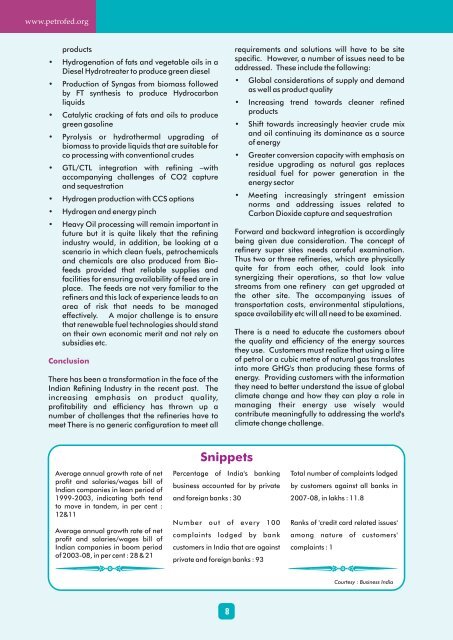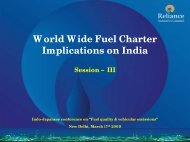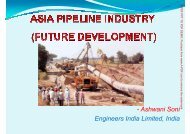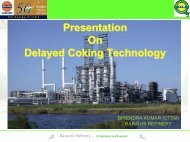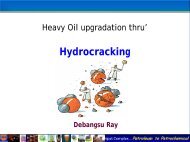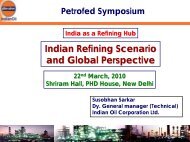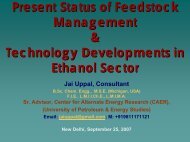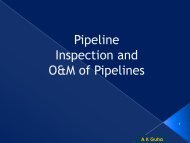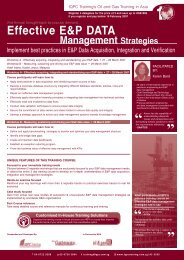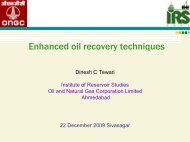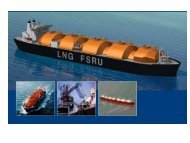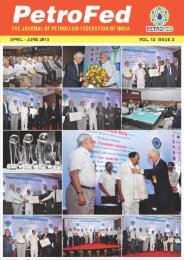Chapter -1 final last new font final - petrofed.winwinho...
Chapter -1 final last new font final - petrofed.winwinho...
Chapter -1 final last new font final - petrofed.winwinho...
Create successful ePaper yourself
Turn your PDF publications into a flip-book with our unique Google optimized e-Paper software.
www.<strong>petrofed</strong>.org<br />
products requirements and solutions will have to be site<br />
• Hydrogenation of fats and vegetable oils in a<br />
Diesel Hydrotreater to produce green diesel<br />
specific. However, a number of issues need to be<br />
addressed. These include the following:<br />
• Production of Syngas from biomass followed<br />
by FT synthesis to produce Hydrocarbon<br />
• Global considerations of supply and demand<br />
as well as product quality<br />
liquids • Increasing trend towards cleaner refined<br />
• Catalytic cracking of fats and oils to produce<br />
products<br />
green gasoline • Shift towards increasingly heavier crude mix<br />
• Pyrolysis or hydrothermal upgrading of<br />
biomass to provide liquids that are suitable for<br />
and oil continuing its dominance as a source<br />
of energy<br />
co processing with conventional crudes • Greater conversion capacity with emphasis on<br />
• GTL/CTL integration with refining –with<br />
accompanying challenges of CO2 capture<br />
and sequestration<br />
residue upgrading as natural gas replaces<br />
residual fuel for power generation in the<br />
energy sector<br />
•<br />
•<br />
Hydrogen production with CCS options<br />
Hydrogen and energy pinch<br />
• Meeting increasingly stringent emission<br />
norms and addressing issues related to<br />
Carbon Dioxide capture and sequestration<br />
• Heavy Oil processing will remain important in<br />
future but it is quite likely that the refining<br />
industry would, in addition, be looking at a<br />
scenario in which clean fuels, petrochemicals<br />
and chemicals are also produced from Bio-<br />
feeds provided that reliable supplies and<br />
facilities for ensuring availability of feed are in<br />
place. The feeds are not very familiar to the<br />
refiners and this lack of experience leads to an<br />
area of risk that needs to be managed<br />
effectively. A major challenge is to ensure<br />
that re<strong>new</strong>able fuel technologies should stand<br />
on their own economic merit and not rely on<br />
subsidies etc.<br />
Conclusion<br />
There has been a transformation in the face of the<br />
Indian Refining Industry in the recent past. The<br />
increasing emphasis on product quality,<br />
profitability and efficiency has thrown up a<br />
number of challenges that the refineries have to<br />
meet There is no generic configuration to meet all<br />
Snippets<br />
8<br />
Forward and backward integration is accordingly<br />
being given due consideration. The concept of<br />
refinery super sites needs careful examination.<br />
Thus two or three refineries, which are physically<br />
quite far from each other, could look into<br />
synergizing their operations, so that low value<br />
streams from one refinery can get upgraded at<br />
the other site. The accompanying issues of<br />
transportation costs, environmental stipulations,<br />
space availability etc will all need to be examined.<br />
There is a need to educate the customers about<br />
the quality and efficiency of the energy sources<br />
they use. Customers must realize that using a litre<br />
of petrol or a cubic metre of natural gas translates<br />
into more GHG's than producing these forms of<br />
energy. Providing customers with the information<br />
they need to better understand the issue of global<br />
climate change and how they can play a role in<br />
managing their energy use wisely would<br />
contribute meaningfully to addressing the world's<br />
climate change challenge.<br />
Average annual growth rate of net Percentage of India's banking Total number of complaints lodged<br />
profit and salaries/wages bill of<br />
Indian companies in lean period of<br />
business accounted for by private by customers against all banks in<br />
1999-2003, indicating both tend<br />
to move in tandem, in per cent :<br />
12&11<br />
and foreign banks : 30 2007-08, in lakhs : 11.8<br />
Number out of every 100 Ranks of 'credit card related issues'<br />
Average annual growth rate of net<br />
profit and salaries/wages bill of<br />
complaints lodged by bank among nature of customers'<br />
Indian companies in boom period customers in India that are against complaints : 1<br />
of 2003-08, in per cent : 28 & 21<br />
private and foreign banks : 93<br />
Courtesy : Business India


